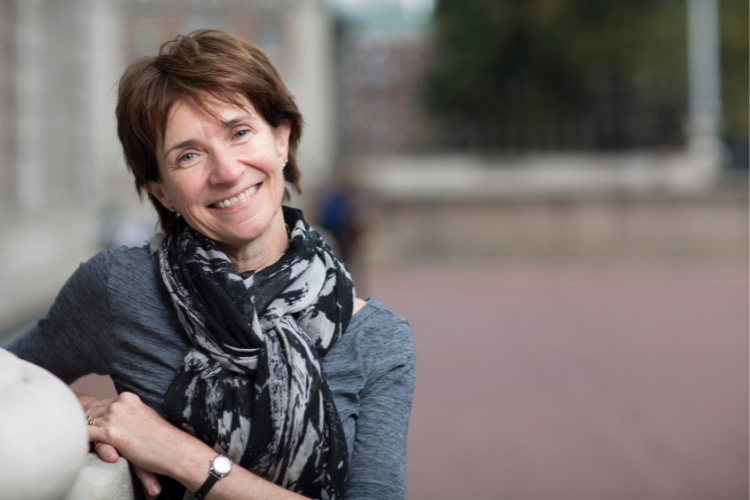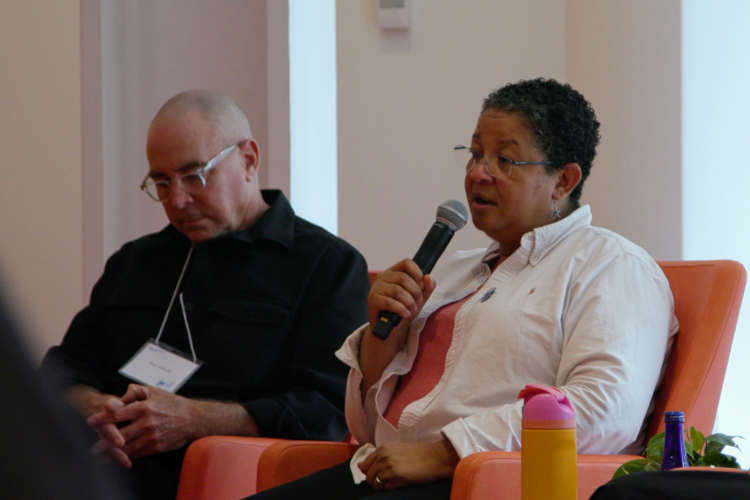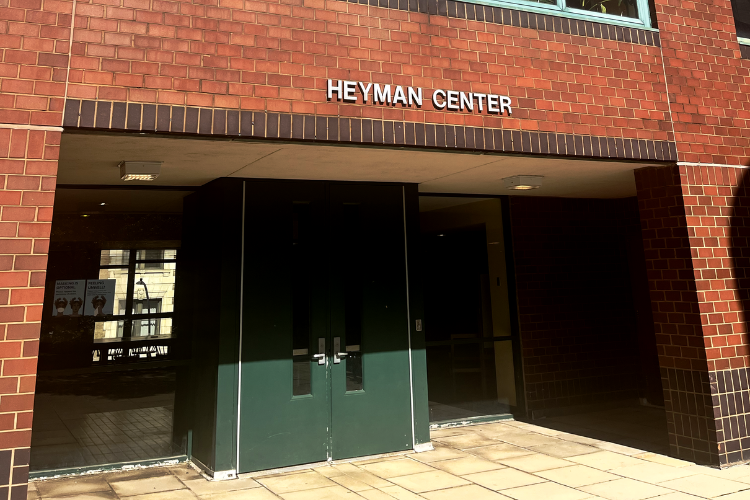'Doing the Work of Making Knowledge Together': SOF/Heyman Center on the Importance of Community Collaboration
Eileen Gillooly spoke about the importance of community conversations around justice, health, and humanities.

Engraved and etched in stone upon the attic of Low Memorial Library—which sits at the heart of Columbia's Morningside campus—is a commitment to advancing public good: a guiding principle that has been a driving force behind the local and global work led by The Society of Fellows and Heyman Center for the Humanities (SOF/Heyman), located at 74 Morningside Drive.
From restorative justice-focused programs such as the Justice-in-Education Initiative to community-driven, thought-provoking discussions that examine how literary works can be used as catalysts for transformative social change, the institution has been at the forefront of impactful efforts Uptown that sit at the intersection of justice, health, and humanities.
In its evolution, SOF/Heyman's Executive Director Eileen Gillooly says it will continue to lean into uniting and centering diverse perspectives to address societal challenges. Columbia Neighbors recently spoke with Gillooly about the origin story behind the center, the importance of community engagement, and public programming.
What is the origin story behind The Society of Fellows and Heyman Center for the Humanities in Morningside Heights?
The Society of Fellows was founded 48 years ago as a post-doctoral society for recent Ph.D.s in the humanities and humanistic social sciences. The brick-and-mortar Heyman Center was built in 1981 to house the offices of the Society of Fellows. SOF/Heyman’s mission and vision to address real-world challenges really came into being around the creation of our Public Humanities Initiative in 2014. We launched the initiative in a growing recognition of the urgent need for the humanities to engage with audiences beyond the university. There is a misperception out there, which we wanted to correct, that the humanities are solely about personal enjoyment and have little or nothing to do with addressing the problems of citizens and communities.
Among the initial aims of the initiative was to support public-facing projects designed by graduate students, who are often at the forefront of such efforts, as well as to build their capacity to work with community partners in implementing them. Another aim was to offer the intellectual space and resources to faculty, graduate students, and community partners to incubate projects that had what we would now call Fourth Purpose impact.
What are some of the community-driven projects and initiatives that SOF/Heyman leads?
Our Public Humanities Fellows, a program that grew out of our partnership with Humanities New York, supports graduate projects centered on community impact. We’ve supported a variety of projects, such as making the arts accessible in places like Riker’s Island and a youth empowerment project with Girls Write Now. One of the first big projects that really engages with the community is the Justice-in-Education Initiative—sponsored by the Mellon Foundation—which we’ve partnered with the Center for Justice to create. It provides college courses taught by Columbia faculty and graduate students to those who are in carceral environments and welcomes formerly incarcerated individuals to continue their education at Columbia through our Justice-in-Education Scholars Program. One of our current JIE Scholars works for Senator Cordell Cleare.
For several years before the pandemic, we partnered with the Writing Division of the School of the Arts, which has a summer creative writing program for high school students, making it possible for about a dozen students to attend free of charge. We’ve provided support for the Zip Code Memory Project. We’ve also supported the Beyond the Bars conference. Almost all of the public humanities-centered initiatives are in Harlem or Uptown. A lot of it is experimenting and seeing what is effective.

A lot of SOF/Heyman events are centered on literary works, how can literature be used for both personal and societal transformation? Do you have any enlightening book recommendations that folks interested in learning about the public humanities can dive into?
While we at the SOF/Heyman think of the humanities in its most capacious sense, we also continue to value the core humanities disciplines—and literature is one of the easiest humanities disciplines for the general public to engage, as the popularity of book clubs attests. There’s a series of books called Our Compelling Interests: The Value of Diversity for Democracy and a Prosperous Society. It explores the paradoxes of diversity and inequality. It examines civil rights legislation in the '60s and explores ideals that inform our thinking about social cohesion, what it means to assimilate or integrate, and what multiculturalism is.
Can you talk about the importance of having neighbors and community members involved and engaged in SOF/Heyman conversations centered on the public good?
Given the assault on education and institutions of higher learning—I’m thinking of the recent rise in book banning and of state legislatures wresting control of their universities or defunding whole departments—there is an urgency to make the public understand, especially those who financially control our colleges and universities, that the mission of the university in the 21st century is and ought to be produce knowledge that promotes the public good. We have an ethical and social responsibility to step out of the ivory tower and to rethink what it means to educate the public—not just our students, but all our fellow citizens, and especially those in our communities. There’s no real progress that can be made unless people are working together. The transmission of knowledge is not just from the lecturer to the ear of somebody: it’s doing the work of knowledge together. One of the things we’ve learned from the Justice-in-Education Initiative is that the people whom you want to help and serve must not only be part of the group working on a solution: they must be leading it in some way.
I’m not alone in thinking that the problems we face as citizens in the world are so complex that it’s impossible to even begin to address them without collaboration. We need to think together with folks who can bring to the table knowledge from as many disciplines and perspectives as possible. We need to be committed to working together to figure out solutions. And we need to persist in doing the work, no matter how little progress we seem to be making.
"There’s no real progress that can be made unless people are working together. The transmission of knowledge is not just from the lecturer to the ear of somebody: it’s doing the work of knowledge together."

What role do you envision SOF/Heyman playing in the local community?
Partnerships are built on trust, and the process of building trust is always pretty slow. I think Columbia as an institution has made some significant strides recently in cultivating trust, but it’s an ongoing process. The more you work together, the more the trust builds. There are continuing challenges, of course, but the rewards are great. Our recent Recovery in Practice event was very successful in this regard—bringing together Columbia faculty and students with more than a dozen community groups--and its afterlife will be even more so. We’ve got lots of people asking for the video recording, so hopefully, it will be useful for the community.
Our Justice-in-Education Scholars Program has been life-changing for a lot of people. There have been 100 folks or more who have earned Columbia college credits through the program. Some of them have graduated from Columbia School of General Studies, and some have earned degrees elsewhere. Some of our Scholars have come back to Columbia and are paying it forward by working on projects that create career opportunities for other justice-impacted individuals. It’s all about making these connections and watching them grow.
How can community members and neighbors access SOF/Heyman's lectures and events?
With few exceptions, everything is open to the public, and registration is always free. I’d encourage folks to visit our website and check out our upcoming events to see what may be of interest to them. We send out a weekly newsletter highlighting our upcoming events and also share events from our partners. For those who can't come in person, many of our events are hybrid, and we post recordings on our website. We have an SOF/Heyman mailbox, and we’re always happy to answer questions. We want people to know that they are welcome.